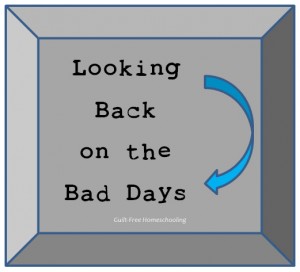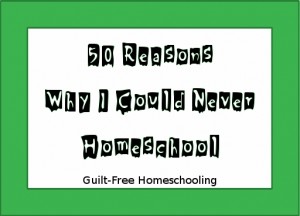Homeschooling requires a minimal amount of preparation: it can be started with a few books to read, some paper and pencils, and a few broken crayons as basic art supplies. Institutional schools receiving government funding would lead us to believe that much, much more is needed for adequately educating students. I quickly discovered that certain institutional necessities were, in fact, completely unnecessary in our homeschool setting. And so, here, without further ado, are the Top Ten Things I Did NOT Need for Homeschooling.
10. Attendance Charts, Seating Charts, Hall Passes, or Restroom Passes — We relaxed and made ourselves at home… because we were at home.
9. Lunch Punch Cards — Our lunches were all paid for before we took the groceries home from the store.
8. Hall Monitors — I could hear trouble from anywhere in the house.
7. Playground Monitors — Unless you want to count the dog.
6. Harassment Policy or That Desk Facing the Wall in the Back of the Room for the Disruptive Kid — “Don’t hit your sister,” “Don’t hit your brother,” and “Go to your room” covered it all for us.
5. Parent/Teacher Conferences — Unless you want to count talking to myself.
4. AIDS Awareness; Diversity Day; or G*y, L*sbian, Transg*nder, & Bis*xual Day — We were too busy with learning the more important aspects of education… such as how to read, write, and calculate.
3. Police Officers, Metal Detectors, or Pepper Spray — I even encouraged my students to use and carry pocket knives.
2. Zero Tolerance Policies — I possess critical thinking skills and know how to use them to analyze problems on a case by case basis.
And finally, the Number One Thing that I did not need for homeschooling my own children…
1. RITALIN! or any other mind-numbing drugs to control active children — Physical exercise was much more effective for getting the wiggles out and preparing my students to learn.
*[Unfortunately, the spelling of certain words must be altered to reduce unwanted search engine hits. I apologize for any confusion.]





 Guilt-Free Homeschooling is the creation of Carolyn Morrison and her daughter, Jennifer Leonhard. After serious disappointments with public school, Carolyn spent the next 11 years homeschooling her two children, from elementary to high school graduation and college admission. Refusing to force new homeschooling families to re-invent the wheel, Carolyn and Jennifer now share their encouragement, support, tips, and tricks, filling their blog with "all the answers we were looking for as a new-to-homeschooling family" and making this website a valuable resource for parents, not just a daily journal. Guilt-Free Homeschooling -- Equipping Parents for Homeschooling Success!
Guilt-Free Homeschooling is the creation of Carolyn Morrison and her daughter, Jennifer Leonhard. After serious disappointments with public school, Carolyn spent the next 11 years homeschooling her two children, from elementary to high school graduation and college admission. Refusing to force new homeschooling families to re-invent the wheel, Carolyn and Jennifer now share their encouragement, support, tips, and tricks, filling their blog with "all the answers we were looking for as a new-to-homeschooling family" and making this website a valuable resource for parents, not just a daily journal. Guilt-Free Homeschooling -- Equipping Parents for Homeschooling Success!

Recent Comments